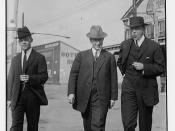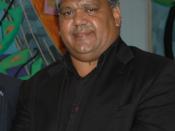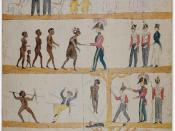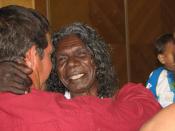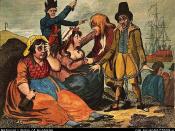The following essay is a rationale of a ten-week Australian history course for senior high school students. This said the target audience would be sixteen and seventeen year olds, with the view to after ten weeks, have a basic knowledge of the topics covered in the course. This essay will be supported with suitable evidence, and as the question is based generally on personal opinion, some use of non-academic references will be utilised.
As it is only for a ten-week duration, the amount of topics covered will be three. This number was decided on as it allows the most to be learnt, as each topic will have three weeks allocated towards it. Any less than three weeks to learn a certain topic would not be sufficient. Of those three weeks, the first two will see the topic addressed, with the third week being a review and discussion of the previous two weeks work, as well as a brief look at the next topic.
A short test will also be given. The final week, week ten will be an overall review and discussion week and a final essay will be due.
Marks for this ten-week course will be divided among the three short tests and the finial essay. Participation in the discussions in the third, sixth, ninth and tenth weeks, will also be assessed. The finial essay will be the main focus of the grade, being forty-five percent. Each test will be fifteen percent and discussion participation will be marked at ten percent.
Throughout the ten weeks, the students will gradually come to their own conclusion of the concept of the Australian identity. Their final essay will be their perception of what it is, and what it means to them. These essays must include references to real case studies of the people that have influenced Australia's history. In learning about the history of Australia, they are to make connections with their own lives, and try to understand how things are different now, to what it was, and why the perception of the Australian identity has changed over the years.
As the students learn about the history of their country, they are encouraged to develop their skills of empathy, research and analysis. This ten week course will fashion research practice as it asks students to interpret a range of primary and secondary source materials including visuals, books and web-based articles, in order to frame questions and debate interpretations. These debates will happen in the third week of each topic.
The three topic chosen are 'The Landing at Botany Bay', 'War' and 'Indigenous Australians'. These topics have been chosen because people worldwide are under the perception that this forms the basis of Australia's historical, and national, identity. The landing at Botany Bay is where it all started and how we started to form into the Australia we are today, War gives Australians something to base their national identity on, and Indigenous Australians describes the oldest living race of Australians.
The Landing at Botany Bay will be the first topic, and will run over weeks one, two and three. Factors concerning that day in January 1788, and the weeks and months that followed will be the main focus points. Botany Bay is where Australia first started to become somewhat a fraction of what is it today. Before then, the only know history was a few documented trips and brief landings. But after Botany Bay had been discovered and ships had docked there and settlement had begun, Australia had been written into the history books. Some case studies of pioneering families will be reviewed to aid students with their final essay.
War will be the second topic that will be discussed. It will run over weeks four, five and six. This is a popular topic for Australians as it give us a basis for a national identity. The ANZAC theory is a good example of this and will be discussed via case studies, accounts by war correspondences, and encounters by war veterans.
In the third week of this topic, week six, there will be a discussion on the differences in documentation of the war. War correspondents and war veterans have vastly different opinions on what happened during this period of time. Why it was documented the way it was will be a valid point in weather or not history would be different. This will also play a part in the student's final essay.
Indigenous Australians will be the third topic, and will run over weeks seven, eight and nine. During this topic students will learn small amounts of information from a large variety of sub-topics. Sub-topics such as land rights, native title, the stolen generation, reconciliation, information on native languages, tribal traditions and native song will be discussed and learnt. Case studies such as the well-known Marbo case will be used to aid the students with their finial essays.
As stated previously, in weeks three, six and nine discussions will be held on the designated topics. These will be graded as class participation. There will also be a short test on the information covered in the topic. These will be graded as well. In week ten, the students' finial essay will be due, and an overall discussion on the course will occur.
The main focus point, and the end result of this ten-week course, is for the students to have better knowledge of the Australian history and to have expanded their view of the national identity of their country.
Bibliographyhttp://www.showroom.com.au/aushistory.htmhttp://cedir.uow.edu.au/programs/FirstFleet/objectv.htmlhttp://www.austemb.org/history.htm

